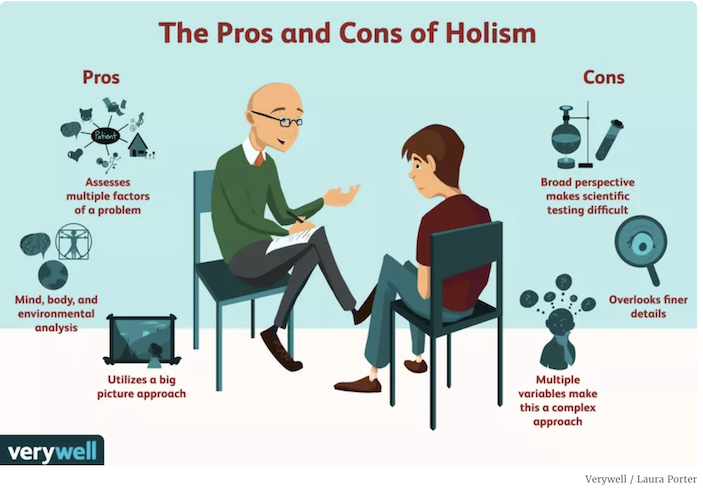Reductionism vs holism
 One of the key "battles" in psychology is between reductionist and holistic explanations of behaviour. It is important that psychologists employ both reductionist and holistic approaches to studying behaviour as each approach has its benefits. Unfortunately, students often think that reductionism is a limitation of a research study. This is not the case. In addition, there are many misunderstandings about the meaning of reductionism. The big question in psychology is not whether or not reductionism has value - it is to what extent it can be useful.
One of the key "battles" in psychology is between reductionist and holistic explanations of behaviour. It is important that psychologists employ both reductionist and holistic approaches to studying behaviour as each approach has its benefits. Unfortunately, students often think that reductionism is a limitation of a research study. This is not the case. In addition, there are many misunderstandings about the meaning of reductionism. The big question in psychology is not whether or not reductionism has value - it is to what extent it can be useful.
Reductionism and holism defined
Reductionism is the belief that human behavior can be explained by breaking it down into smaller component parts.
Reductionism is often seen as a strength of the biological approach. Supporters of a reductionist approach say that it is scientific. Breaking complicated behaviors down into small parts means that they can be scientifically tested. Then, over time, explanations based on scientific evidence will emerge. Reductionist approaches strive for high internal validity with the goal of determining causal relationships.
Using a reductionist approach, psychologists could find a neurotransmitter that is responsible for depression or a gene that is responsible for resilience.
When considering whether a study is reductionist, we have to look at both the theory on which the study is based and the research method that was used.
Holism refers to any approach that emphasizes the whole rather than its constituent parts. Holistic approaches collect qualitative data and attempt to understand how the context or environment of an individual may affect their behaviour. They recognize that there are many factors that may interact that lead to a behaviour.
The following video summarizes the difference between the two concepts. After watching the video, answer the questions in the box below.
Checking for understanding
1. According to the video, what is meant by a holistic approach to understanding conformity?
A holistic approach argues that conformity only takes place in specific social contexts.
2. What is meant by the terms "upward" and "downward" causality? How do these terms relate to reductionism and holism?
Reductionists argue that behaviour is caused by "lower-level entities." For example, neurotransmitters may lead to mental illness. Holistic interpretations focus on downward causation - how the system, environment, or social context affects the behaviour of individuals.
3. What is meant by the concept of emergence?
That there are different levels of explanation and those levels cannot all be reduced to the same lower level. A holistic approach to mental illness takes a biopsychosocial approach. The focus is on how things change over time by interacting with systems.
4. To what extent is objectivity important in a reductionist or holistic approach to research?
Reductionism takes the position that behaviour may be studied without bias by putting appropriate controls into place. The findings of research can, therefore, be free of interpretation and be statistically measured and evaluated. Holistic psychology argues that there is no objective truth and that the researcher cannot be completely objective but will always bring in personal experience, bias, and emotion. The reductionist approach looks for one right answer; holistic approaches argue that there is no one right answer, but acknowledges the value of other perspectives.
Environmental reductionism
It is often thought that biological research is reductionist and sociocultural research is holistic. But this is an oversimplification.
 When looking at environmental factors, Behaviorism assumes that all behavior can be reduced to simple building blocks of stimulus-response) and that complex behavior is a series of rewards (reinforcements) and punishments. B F Skinner, perhaps the most famous Behaviourist, could be seen as an "arch-reductionist." He argued that the mind was a "black box" - that is, it could not be empirically observed so therefore it was not worth studying. His argument that our behaviour is simply the result of responding to external stimuli is referred to as environmental reductionism.
When looking at environmental factors, Behaviorism assumes that all behavior can be reduced to simple building blocks of stimulus-response) and that complex behavior is a series of rewards (reinforcements) and punishments. B F Skinner, perhaps the most famous Behaviourist, could be seen as an "arch-reductionist." He argued that the mind was a "black box" - that is, it could not be empirically observed so therefore it was not worth studying. His argument that our behaviour is simply the result of responding to external stimuli is referred to as environmental reductionism.
Any experimental approach that looks at the effect of one IV on a DV is a reductionist approach. The question of "approaches" being reductionist is not truly relevant.
Criticisms of a reductionist approach
 It is also argued that reductionist approaches do not allow us to identify why behaviors happen. For example, they can explain that running away from a large dog was made possible by our fear centers causing a stress response to allow us to run fast, but the same reductionist view cannot say why we were afraid of the dog in the first place. In effect, by being reductionist we may be asking smaller, more specific questions and therefore not addressing the bigger issue of why we behave as we do.
It is also argued that reductionist approaches do not allow us to identify why behaviors happen. For example, they can explain that running away from a large dog was made possible by our fear centers causing a stress response to allow us to run fast, but the same reductionist view cannot say why we were afraid of the dog in the first place. In effect, by being reductionist we may be asking smaller, more specific questions and therefore not addressing the bigger issue of why we behave as we do.
It has been suggested that the use of reductionist approaches depends on the purpose to which they are put. For example, investigating brain response to faces might reveal much about how we recognize faces, but this level of description should not perhaps be used to explain human attraction.
Focus: One of the major benefits of reductionism is that it allows researchers to look at things that can be incredibly complex and break them down into smaller parts that are easier to investigate. Instead of studying "depression", the researchers study the potential role of a single gene in depression.
Method: Identifying specific potential causes allows for an experimental approach that may determine causal relationships. This is a deductive approach that is based on past research and theory.
Interaction: When the focus is on a single variable, the question of how this variable may interact with other factors is often not considered. This is due to the low ecological validity of many experimental studies.
Problem-solving: Reductionism is looking for universals of human behaviour. If they could find that a neurotransmitter causes OCD, then this could lead to treatment that could be available to OCD patients anywhere. However, so far this approach has found few such examples.

Method: A holistic approach often works with case studies. This method produces rich data, but they are time consuming and the results are difficult to generalize or transfer beyond the case study.
A holistic approach is not dependent on identifying the variable or factor before carrying out the research. Psychologists may see things they might have otherwise missed. Holism tends to be inductive, looking for trends and patterns of influences on behaviour. The research may generate hypotheses, but it does not start with a hypothesis.
Holistic approaches tend to be more collaborative. One cannot expect a biologist to also be an expert in cognitive and sociocultural approaches to behavior. This teamwork is an essential component of a holistic approach that looks at different perspectives on behaviour.
Problem-solving: Holism acknowledges that "one size does not fit all." Psychologists acknowledge that a more complete profile of the individual is necessary when finding solutions that address all of the contributing internal and external factors that might be influencing the health of an individual. This is sometimes more effective than addressing smaller components individually.
Focus: When trying to solve a problem, it is often important to focus on a particular aspect of the issue in order to come up with a solution. Holism tends to be more generalized, which can sometimes make precision more difficult. Looking at something too broadly can make it difficult to conduct tests using the scientific method, largely due to the fact that it incorporates so many varied factors and influences.
Thinking critically
There are some common mistakes made by IB Psychology students in both exams and Extended Essays with regard to reductionism and holism. For each of the following statements, can you see why they are not correct?
- The study found that people with the two short alleles of the 5-HTT gene that had experienced three or more stressful life experiences were more likely to have depression. One limitation of the study is that it is reductionist.
- The study of HM is reductionist, arguing that memory is localized.
- One limitation of a reductionist approach is that it does not take into consideration other perspectives.
- One limitation of this theory is that is reductionist.
- One limitation of the case study is that it cannot be generalized to the whole population.
When discussing the "thinking critically" box, here are some suggested explanations of why the four comments above are not correct.
1. Epigenetic studies, like Caspi, attempt to look at the interaction of genes and the environment. This is not a reductionist approach; the study looks at more than one factor in human behaviour. No one study will ever look at "all" potential variables.
2. This is not correct for several reasons. The argument that "memory is localized" is not reductionist. The problem with this statement is just the opposite - it is too vague and not specific. We do know that certain types of memory are localized and that memory is actually the result of the interaction of several parts of the brain. A single memory may involve emotion, spatial memory, and facial memory. The activation of that memory involves several localized functions. The study of HM actually helps us to understand that. In addition, the study is a case study which uses a holistic approach to understanding HM's behaviour.
3. This is simply a definition of reductionism. It is not a limitation.
4. Theories are reductionist by nature. They predict the influence of a factor or factors on behaviour. This really doesn't mean anything. It is not a valid limitation.
5. This is also problematic. Most case studies are not attempting to generalize to the global population. For example, when students say that a problem with Brown and Harris is that they cannot generalize to men, they are adopting a reductionist approach to analysing this study. The goal of a case study is to generalize to the population from which the sample was drawn - not to draw universal conclusions.

 IB Docs (2) Team
IB Docs (2) Team
